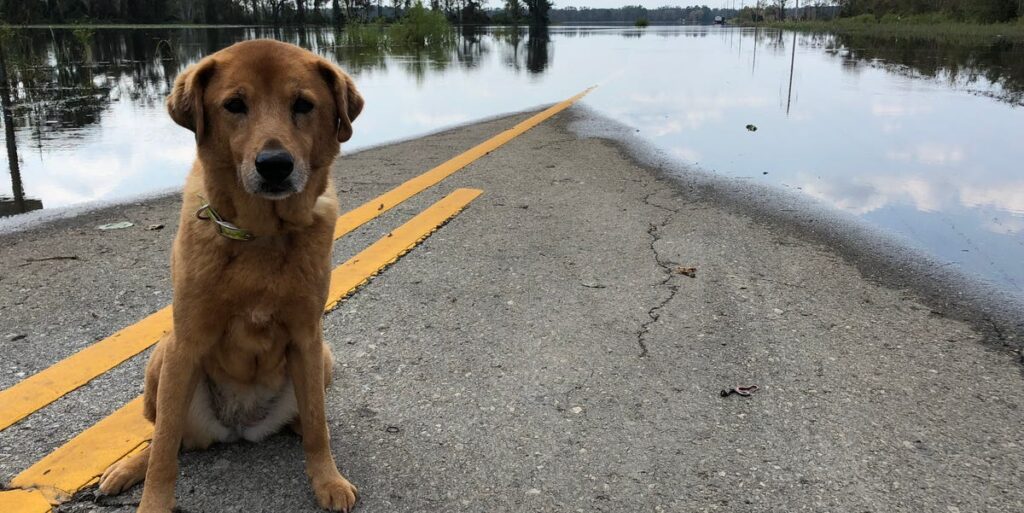Wildfires, tornadoes, hurricanes. Severe weather and natural disasters are becoming more commonplace for people across the country. Many of us think of our pets as our own children, but a new study finds that only one-third of Americans have a disaster plan for their pets.
I have been involved in the pet world for a long time as a certified professional dog trainer and FIT DOG instructor. But it wasn’t until Hurricane Sandy hit New York City in 2012 that I realized how vulnerable I, my two cats, and my three dogs were to natural disasters. Soon after, I did some research, consulted experts, and came up with strategies to keep my pets safe should severe weather affect my home again. You should too. Start here:
How to prepare for bad weather
Viktoria Skorikova
Once the winds are calm and the skies are clear, it’s time to get your plans and supplies ready.
plan an evacuation route
If you evacuate to a shelter during a natural disaster, make sure you have enough supplies in your home to care for your pet for an extended period of time until normal life returns.
You may also want to think about where you will go if you need to evacuate. If you live in a hurricane-prone area, please check the evacuation routes you usually take. Find out which hotels along your route allow pets (some will waive their no-pet policy in case of an emergency). Alternatively, check with friends and family ahead of time to see if your pet can evacuate to your home with you. Also, if your pet has not yet been microchipped, consult your veterinarian.
Create a pet emergency kit
Everyone in your household should have their own emergency kit, including pets. These include just about everything your pet might need if you need to evacuate or evacuate.
A crate or carrier for each pet Cat and dog collars with updated ID tags Extra leashes Enough food for a week Enough water for everyone, including your pet, for several days or a week Be prepared with any medications your pet may take or are given regularly or as needed, such as for arthritis Treats to help with stress Toys to relieve stress or boredom You should prove ownership right away. Print copies of all your pet’s veterinary records, as they may be difficult to access online in an emergency. Pet first aid kit with supplies to treat minor injuries Contact information for emergency veterinary hospitals in your local area and the area you are evacuating to. Battery/solar powered lights, filters, etc. needed for fish, reptiles, and other exotic pets during power outages.
train pets to love their owners
Before a natural disaster occurs, get your pet used to spending time in a cat crate or dog carrier. If you need to evacuate, you may need to leave your pet in a kennel at a shelter or in your car. If your pet is already used to being in a carrier, the evacuation process will be less stressful.
To help your pet get used to the carrier, take the carrier outside the house and let it get used to it. To help your pet develop a positive relationship with the carrier, place toys or treats inside that are easy for your pet to find. Pairing a carrier with something your pet finds rewarding will encourage them to choose to spend time inside. This can reduce your pet’s stress when you need to confine your pet in an emergency.
evacuation drill
Perform evacuation drills with your pet regularly. Practice gathering your emergency kit, carrier bag, and pets. This will allow you to see if any items are missing or need to be replaced. You can also get your pet used to the process of hasty collection. This reduces stress in a real-life emergency situation and makes it less likely that your pet will hide when you need to quickly gather your family and evacuate.
What to do when bad weather hits
asia vision
Keep these tips in mind before and during a disaster.
monitor pets
Natural disasters stress not only humans but also pets, and pets may behave unexpectedly when bad weather occurs. Keep cats out of patios and dogs out of fenced backyards before and during storms. Instead, keep your pet on a leash or indoors. Bad weather can scare pets, and bad weather can damage fences and allow pets to accidentally step outside and get lost.
Prepare for the worst scenario
be with me
During a natural disaster, it is important to spend time with your pet. If you think you need to evacuate immediately, keep your pets in a small area of your home, such as a bedroom, so they can gather easily. Red Cross and other emergency shelters are increasingly creating areas where pets can stay while people are housed in other areas. If an evacuation order is issued for your area, please take your pets with you and do not leave them behind.
Other ways to stay prepared:
Sassafras Patterdale (ze/hir) is an award-winning author and freelance writer. Sassafras’ work has been recognized by organizations ranging from the American Library Association and Lambda Literary Foundation to the Canine Writers of America and the Cat Writers Association. Sassafras’s work has been widely published, and Zé is the author of 12 books. Follow Sassafras @SassafrasPatterdale and SassafrasPatterdale.com.

